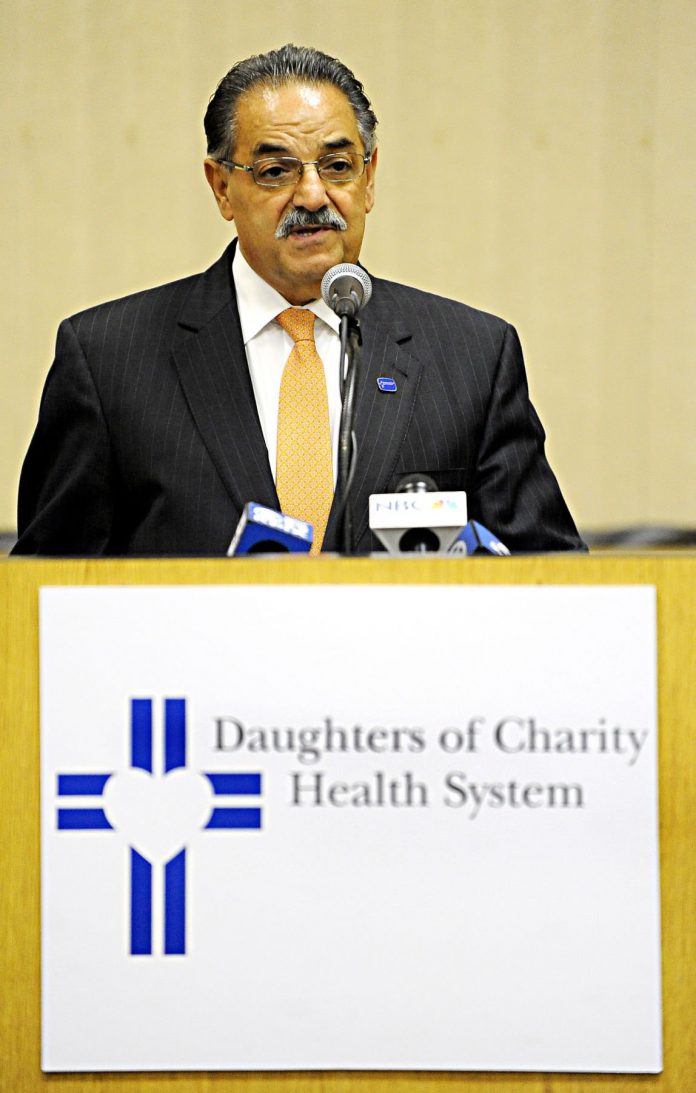
With a one-year agreement already in place with the California Nurses Association and a guarantee to keep the hospitals operational for the next five years, Prime Healthcare announced Friday morning its purchase of the Daughters of Charity Health System, including Gilroy’s Saint Louise Regional Hospital.
“I promise you that they will be staying open forever and we will not cut services,” said Prime Healthcare founder, President and Chief Executive Officer Prem Reddy during the Oct. 10 press conference held at O’Connor Hospital in San Jose.
Reddy also confirmed that Prime Healthcare will infuse $150 million in capital improvements at the DCHS facilities, protect 7,600 jobs and assume more than $300 million in pension guarantees for more than 17,000 union and non-union active and retired workers.
“It’s a relief that finally we now know who the buyer is and we’re very excited because Prime has reassured us that they are committed to keeping all the hospitals with their services open,” said Maribel Licardo, a registered nurse at O’Connor for the last 22 years.
Licardo added she’s had “good experiences with the Daughters” over those years, but is also “looking forward to working with Prime as long as they allow us to continue to provide the excellent service that I believe we give to our patients.”
However, not everyone considered the announcement good news.
Upon learning of the sale to Prime, representatives of the SEIU-United Healthcare Workers West announced they will fight to stop the sale—which must be approved by California Attorney General Kamala Harris before being finalized. The union believes “Prime puts profits over patients and doesn’t share Daughters’ mission of serving the poor,” according to a press release from the SEIU-UHW.
The optimism from DCHS and Prime Healthcare officials at Friday’s press conference was starkly contrasted by warnings from SEIU-UHW, which has 3,700 members at DCHS facilities and three Prime-owned hospitals in California.
“I’m shocked that DCHS has made this decision,” said Caroline Plaza, a trauma room assistant at St. Francis Medical Center in Lynwood. “The company would rather see how much money they can earn than how many people they can help get better.”
According to its leaders, 29 state legislators, 14 community organizations and four county supervisors have urged Harris to block the sale because the “acquisition would undermine access to healthcare for low-income people and likely result in significant layoffs.”
“It’s disappointing and hard to understand how Daughters of Charity’s current owners could turn their back on 100 years of serving the poor by selling to a company with Prime’s history,” said SEIU-UHW President Dave Regan. “We are not going to roll over and risk watching Prime Healthcare cut services, raise prices and layoff caregivers like they’ve done in so many other communities in California and other states.”
Reddy, along with DCHS President Robert Issai who plans to stay on until the transaction is finalized and subsequent transition is complete, said those claims are untrue.
Reddy said there will be layoffs—mostly of mid-level management positions—and not from clinical positions.
“Prime Healthcare is saving our hospitals and extending our mission of care,” Issai said. “None of the other bidders offered as many benefits and none of the buyers except Prime Healthcare would accept 100 percent responsibility for the pensions of over 17,000 employees and retirees (who) can rest assured the future is now safe for them.”
Registered nurse Donna Fisher, who has worked in South County since 1983 and at SLRH since it was built in 1989, said she was glad to finally gain some closure since it was announced in January that DCHS was up for sale. The bidding and selection process was kept confidential and nurses were frustrated by that, even holding several vigils outside of DCHS hospitals.
“After two years of uncertainty, it is time to move forward,” Fischer said. “Any delay or attempt to interfere with the sale right now puts vital hospital services, jobs and the health of our communities at risk.”
According to a CNA press release, its nurses were satisfied with the agreement that guarantees Prime Healthcare will operate and maintain all existing healthcare services at the hospitals for at least the next five years.
“Nurses are relieved for our community that we could reach a binding agreement with Prime that aims to continue serving our patients for years to come,” registered nurse Nella Manaytay added.
When asked the purchase price, however, neither Reddy—who founded Prime Healthcare in 2001—nor Issai would commit to an exact number amount.
“We’re not buying DCHS. We’re taking over all assets and liabilities,” Reddy said. “There’s no price. The entire system is our responsibility.”
Issai, describing DCHS as a “distressed operation,” added: “It’s hard to put a monetary value to it.”
Along with SLRH and O’Connor, the DCHS system included Seton Medical Center in Daly City, Seton Coastside in Moss Beach and St. Francis Medical Center in Lynwood.
Prime Healthcare—which was recognized as one of the nation’s 10 Top Health Systems in 2009 by Thomson Reuters—has saved 29 hospitals and 35,000 jobs in nine states, Reddy said. The native of India and Apple Valley, Calif. resident also touted that Prime has spent more than $800 million since 2005 on capital improvements and new equipment for facilities.
“We are still growing,” he said.
Reddy said Prime Healthcare is a for-profit operation, but his family also founded the nonprofit Prime Healthcare Foundation—which has $800 million in net assets, including four in-state hospitals and two in Texas.













